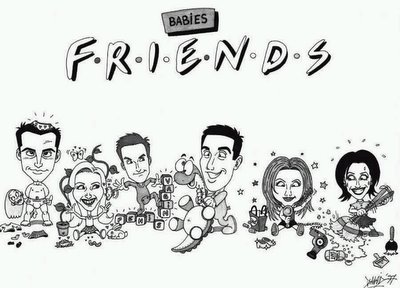
I wanted a friend.
I had heard of a local society, The Friends of the Friendless that sold friends. They owned the Sorry Sod Social Club and had a Saturday stand at Union Station in Washington. But The Friends of the Friendless specialized in young people. I'd been in contact with young people. They are not people I wanted to befriend. I wanted a proper friend, a middle-aged one. Could The Friends of the Friendless procure for me a middle-aged friend?
Well, yes, they probably could. My neighbor had friends, and he told me that if I ordered one before it was befriended by someone else the friend wouldn't have to be inspected by the Department of Social Relations, a little known federal agency established in the waning days of the Clinton Administration to ensure that anyone who wanted a friend would have a decent friend. This, people said, was a good thing. In effect, it was explained to me, I'd be buying a well-seasoned friend with lots of life experience -- "Think of a friend as a pet" -- rather than a purchased friend sold by The Friends of the Friendless. (The social logic of the Department of Social Relations is based on a belief that all government agencies are good, even if they were established to oversee the buying and selling of friends, which you would have thought was good in any event.) But when I appeared the following Saturday the prospective friend that was offered up for sale was definitively a loser, dressed in cutoffs and a threadbare T-shirt that reeked from beer and a lack of basic hygiene: a large-sized fellow, about two-hundred-twenty pounds, about six feet tall, with a little too much on view, including a pot-belly that was ill-concealed by the aforementioned noisome T-shirt.
The challenge was getting the friend to come to my home to hang out with me. The decrepit state of the individual insured that every passerby knew what I'd bought. He was not your normal parcel of urban shopping. It was not a normal Union Station purchase, either, and many people looked at me as though I were a bad man to have purchased another human being to ensnare him in the bondage of friendship. One woman stood in front of me with her arms across her chest in open disapproval. I was tempted to make small conversation with my new acquisition against the street lamp pole. ("Mind if we chat here for a few minutes to give the impression that we're old friends blathering it up at this intersection?")
I don't own a car. How would I get my new friend home? Flag a taxi, of course. I waved down a cab and the two of us got in. I, the picture of good hygiene and unquestionable sobriety and my newly-purchased friend, the ill-smelling lout. The three of us -- I, my friend, and the driver -- precariously poised, putted home. I asked the driver to park in front of my building, and, urging my new friend on, staggered to the door, musing, Is there a law against this?
The front-desk manager, Tim Norton, welcomed us with the delight of an unapologetic social-climber, and we stepped into the elevator. But, before we descended (I live on the ground floor), a problem appeared in the Saturday morning dress of a K Street lobbyist, who had come in behind us.
"Gary, do we want another passenger?" I was struggling. Two hundred pounds was akin to a big man. What's more, things had gotten worse for my new acquisition, with beads of sweat dripping down his brow, the T-shirt itself soaked in bodily fluids.
It was a summer day in a small elevator: the front desk manager, the K Street lobbyist, and my friend. The lobbyist turned. I don't know why. Maybe he smelled something, although the smell, as these things go, wasn't bad. He conducted an inventory of the details of my new acquaintance, and when the door opened he exited with considerable dispatch.
"Did you hear the sound he made?" Tim Norton asked with undisguised glee. I had heard it and was distressed. I had been uncomfortable in Union Station. Now I'd made my neighbor sick.
I deposited my friend on the living room couch. I reflected on the difficulty of bringing a purchased friend to one's home. I hadn't wanted to upset my neighbor. I didn't know him well but gathered (from Tim Norton, the front desk manager) that he, too, was a sociable man who knew the value of friends. My friend was a more elementary form of friend he'd been socializing with for years. The realization confirmed something I'd always suspected: people don't want purchased friends. They don't think of people as something to purchase. They think of friends as the outcome of chit-chat and banter that grows into something of at least semi-permanent status. But I, unsociable sod that I am, am incapable of small talk and convivial colloquy, so I have to purchase my friends at the market.
Yes, my friendships are, by necessity, subject to the capricious vicissitudes of the marketplace and therefore beyond my control. At least my new friend didn't cost all that much. And by the terms of the sale, he was mine forever, or until I could no longer endure the odor.
No comments:
Post a Comment